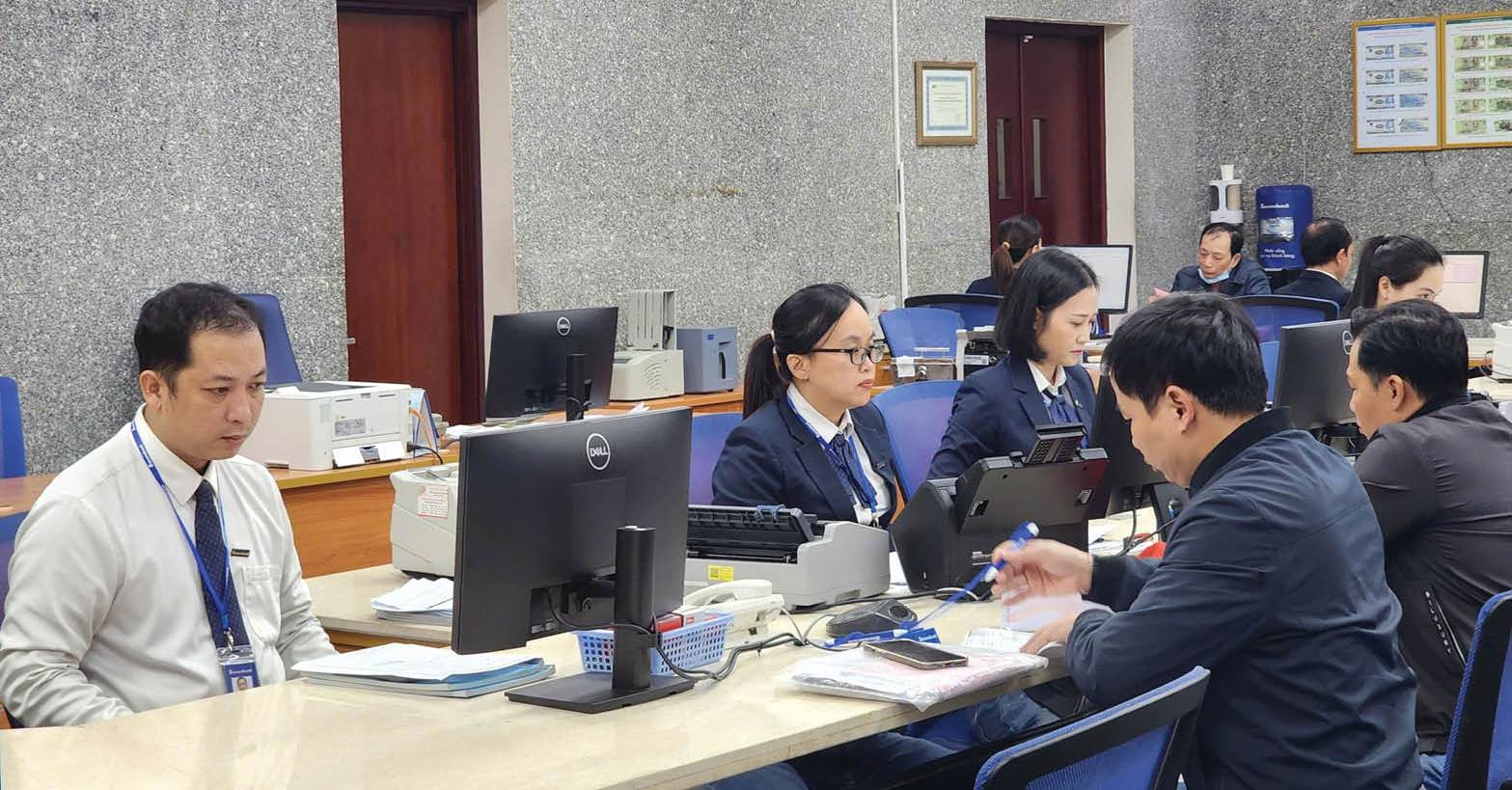 |
| The bank will receive the business's documents and conduct a one-step review before depositing funds. |
Great deal, but...
In the context that SMEs have many difficulties related to capital sources for developing production and business activities, preferential credit capital from the SME Development Fund (Fund) is considered appropriate and attracts the attention of many enterprises.
Mr. Bui Hoang Tung, Head of Lending Department, SME Development Fund informed that the fund is providing capital and supporting capacity building; direct lending, indirect lending for SMEs. In which, mainly SMEs participate in creative start-up activities, participate in industry clusters and value chains. The maximum loan amount under the indirect lending program is not more than 80% of the total investment capital of each project, production and business method. The short-term loan interest rate is only from 1.2%/year and the medium and long-term loan interest rate is 4.4%/year. Enterprises can borrow for no more than 7 years.
Currently, the fund is organizing indirect lending through commercial banks: Vietnam Joint Stock Commercial Bank for Investment and Development (BIDV), Saigon - Hanoi Commercial Joint Stock Bank (SHB), Ho Chi Minh City Development Joint Stock Commercial Bank (HDBank), Military Commercial Joint Stock Bank (MB), Saigon Thuong Tin Commercial Joint Stock Bank (Sacombank), Bac A Commercial Joint Stock Bank (Bac A Bank). In addition to preferential interest rate policies, when participating in the indirect lending program, SMEs are also consulted, trained, and connected in business to help improve their competitiveness.
Compared to the current lending interest rates of commercial banks, the average short-term lending interest rate for priority sectors is around 4-5%; for other sectors it is around 6.7-9%/year, the credit capital from the fund is very preferential. That is the reason why many enterprises have been and are looking forward to the "support" of this capital source.
Ms. Nguyen Thi Hue Phuong, Director of Moc Phuong Furniture Production and Trading Company Limited, shared that the company has now accessed commercial loans. However, the company really hopes to be able to access preferential capital from the SME Development Fund because of low interest rates and long-term incentives, helping the company overcome the current difficult times.
Difficult to access
Despite the desire, some SMEs when approaching and submitting loan applications have been rejected due to problems related to the subjects as well as other constraints.
At the conference connecting support for businesses to access preferential loans organized by the Department of Finance recently, representatives of several banks shared that businesses must meet criteria such as: innovative SMEs, participating in value chains or participating in industry clusters. These businesses must operate in the manufacturing sector... In addition, businesses must operate effectively and be clearly demonstrated in financial reports, financial transparency, and public cash flow, only then will accessing capital from the fund be convenient.
This regulation has made it somewhat difficult for businesses to access this preferential capital source. Ms. Pham Thi Duyen, Anh Tu Group Company Limited, said that in order to access preferential capital sources, in addition to meeting the requirements of the fund, businesses must also meet the standards of the fund's partner banks, which has caused difficulties for businesses. For example, businesses operating in the mechanical field, in the first years of starting a business, businesses will spend a lot of money on investing in infrastructure, machinery and equipment. Therefore, financial reports must have positive cash flow... This is a huge obstacle for businesses. Not to mention, mortgaging real estate assets also needs to be reviewed and expanded, because businesses' assets include not only real estate but also machinery and factories, which are assets that businesses can mortgage.
Returning to the story of regulations on accessing capital sources of the fund, in addition to the fund's regulations related to the subjects of access or general regulations, SMEs also have to face strict regulations of partner banks. Because the fund lends indirectly through partner banks. That is, the bank will be directly responsible for the loan. This means that if the enterprise cannot repay the debt, the bank will suffer financial losses. This is also the reason why banks tend to set conditions to protect themselves from these risks and it is difficult for SMEs to convince banks, especially when they lack collateral or have a bad credit history.
Mr. Le Quang Manh, Deputy Director of BIDV Phu Xuan branch, a lending unit associated with the fund, said that in addition to correctly identifying the target of SMEs operating in a number of fields, enterprises must be transparent in tax reporting and financial reporting, ensuring the effectiveness of the project. Because, the fund's file appraisal process is quite thorough before deciding to transfer capital to the bank for indirect lending. To support enterprises, BIDV still supports customers to mortgage assets such as machinery, equipment, and factories but must ensure the provisions of the law. In addition, SMEs can access preferential credit packages of banks in the short term because currently the short-term interest rates of banks are also quite preferential.
The process of implementing indirect loans of the SME Development Fund will go through 3 steps. When wanting to borrow capital, the SME submits an application to the bank, after receiving the application, the bank will appraise it and send it to the fund for consideration. Based on the appraisal of the application, if it meets the requirements, the fund will decide to transfer capital to the bank for indirect lending. |
Source: https://huengaynay.vn/kinh-te/von-uu-dai-cho-doanh-nghiep-nho-va-vua-canh-cua-hep-152419.html


![[Photo] General Secretary concludes visit to Azerbaijan, departs for visit to Russian Federation](https://vphoto.vietnam.vn/thumb/1200x675/vietnam/resource/IMAGE/2025/5/8/7a135ad280314b66917ad278ce0e26fa)

![[Photo] Prime Minister Pham Minh Chinh meets with the Policy Advisory Council on Private Economic Development](https://vphoto.vietnam.vn/thumb/1200x675/vietnam/resource/IMAGE/2025/5/8/387da60b85cc489ab2aed8442fc3b14a)
![[Photo] National Assembly Chairman Tran Thanh Man chairs the meeting of the Subcommittee on Documents of the First National Assembly Party Congress](https://vphoto.vietnam.vn/thumb/1200x675/vietnam/resource/IMAGE/2025/5/8/72b19a73d94a4affab411fd8c87f4f8d)
![[Photo] President Luong Cuong presents the decision to appoint Deputy Head of the Office of the President](https://vphoto.vietnam.vn/thumb/1200x675/vietnam/resource/IMAGE/2025/5/8/501f8ee192f3476ab9f7579c57b423ad)


















































![[Photo] Prime Minister Pham Minh Chinh talks on the phone with Singaporean Prime Minister Lawrence Wong](https://vphoto.vietnam.vn/thumb/402x226/vietnam/resource/IMAGE/2025/5/8/e2eab082d9bc4fc4a360b28fa0ab94de)





























Comment (0)